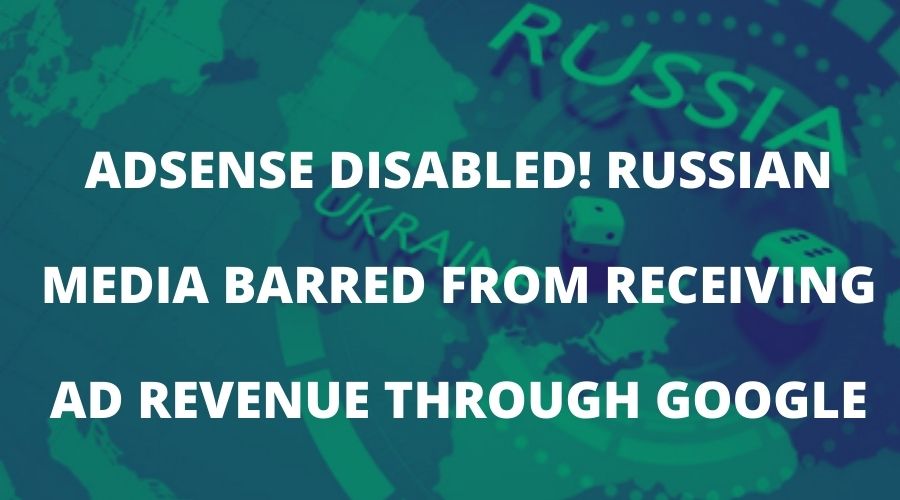
This post was most recently updated on January 18th, 2023
Russia’s state-owned media outlets and other channels were barred from receiving ad revenue on their websites, apps, and YouTube videos by Google on February 26th. This came after similar moves by Meta Platform Inc (FBO), Facebook’s owner, who blocked Russian state-run media from running Facebook ads or generating revenue via FB ads on its services.
Due to these harsh circumstances, Google’s YouTube unit halted AdSense monetization on all Russian-owned Youtube channels followed by website and app monetization.
This includes all the Russian channels affiliated with the current sanctions (For instance: the European Union sanctions).
Ad Placements are mainly controlled by Google and since the Big G owns Youtube here, Russian Youtube channels can bid adieu to their AdSense paychecks. Google has also barred the Russian state-funded media outlets from continuing to use their ad technology.
Russian publishers and YouTubers will not be able to monetize their sites and apps via AdSense, Google AdExchange, Google AdMob, etc that used to be their main ad revenue source.
Furthermore, Russian publishers won’t be able to buy or sell ads via Google Tools. The media outlets can’t place ads on Google’s Gmail and search monetization services as well.
The European Union has announced sanctions against people such as Margarita Simonyan, who is described as RT’s editor-in-chief and a leading figure in Russian propaganda.
Besides the monetization blocks, Youtube videos from Russian media have been barred from the ‘Recommendations and Trending’ section. Any type of Russian media channel will now no longer be accessible in Ukraine post the Ukrainian government requests.
The monetization barring action was immediately taken after the Ukrainian Digital Transformation Minister contacted YouTube to block all propagandist Russian channels like RIA Novosti, TASS, Russia24, etc.
RT aka ‘Russia Today’ which was founded in 2005 has been accused of daily disinformation by Western authorities. Several lawmakers and users have urged Google to take strict action against controversial websites and video channels linked to the Russian government that should not be profiting from spreading misinformation and fake news.
Channels on YouTube earn money from advertisements that appear when users view their videos via AdSense. From ads across 26 YouTube channels it backed, Russia earned an estimated $7 million to $32 million over the past two years.
YouTube removed hundreds of Russian media channels in the past few days, including some for “coordinated deceptive practices,” YouTube’s term for disinformation.
When it comes to sharing ad revenue, YouTube had previously shared that it does not treat state-funded media channels differently from other channels but since circumstances have changed, their ad revenue will be barred. Germany initially banned RT in early February, causing Russia to shut down its Moscow bureau of Deutsche Welle (German media outlet).
The Russian state communications regulator said it had written to Google on February 27th, requesting that Russian media channels on YouTube be restored in Ukraine. Moscow on Feb 26th claimed to limit access to Meta Platform’s Inc’s Facebook as it was censoring Russian media content on the platform.
Google was already under intense pressure since mid-February to pick a side post Ukraine’s invasion.
The scale and ubiquity of social media such as Google, Facebook, and Youtube give them a unique power, but they are profit-driven tech giants so taking a stridently principled stand can impact their bottom line.
Since Moscow declared war on its neighbor Ukraine last week, the besieged nation has urged Google to cut off Russia, while Facebook cut off Russia’s ad services for refusing to budge to Kremlin demands.
Tech giants have faced hindrances dealing with authoritarian governments, including Russia, where Google and Apple complied with government orders to remove an opposition app and were criticized.
The ad-tech industry has been accused of not doing all it could to stifle dangerous misinformation relating to the invasion of Ukraine as the crisis escalates.
CEO of Google, Sunder Pichai took action on barring Russian state media outlets from using their platform post the request from US Senator, Mark Warner.
While tech companies pride themselves on defending free speech & democratic principles, they have also been accused of generating billions in ad revenue from platforms that can have a negative impact on their users.
The Ukraine invasion comes at a time when these dominant social media platforms like Facebook and YouTube have been hit by a significant drop in their value due to concerns over factors like slowing growth, and stress on its key ad monetization business.
Find more information on current content policies for publishers here: https://support.google.com/publisherpolicies/answer/10502938
The latest reciprocation from the Big G regarding Russia’s invasion of Ukraine is suspending Google ads in Russia. Many ads from late February 2022 were displaying false data about the invasion. After the AdSense and ad revenue were cut off a week before the Google ads halt in Russia, Google stands with Ukraine and will not let the Russian state media benefit from this war for financial gains.
Google paused its advertising operations in Russia, which included search, YouTube, and display marketing. As a result of having more than 100+ employees on the ground in Russia, they’ve maintained a cautious approach towards the Russian government throughout the crisis. Russian officials have threatened to prosecute individuals working for companies that operate in violation of the country’s law in the past.
After the RT and Sputnik ban in Europe, Google also stated it won’t allow content from Russian publishers to trend or show up on Google News. Russia’s threats to Big Tech companies really show how online platforms are turning into misinformation-spreading battlegrounds and Google’s reply is more powerful than any government authority out here.
MonetizeMore stands by Ukraine and supports their digital journalism during these tough times.
10X your ad revenue with our award-winning solutions.